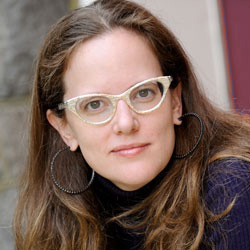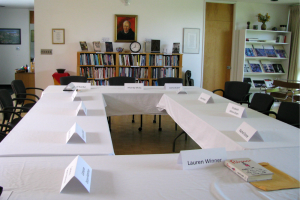
Lauren F. Winner
Lauren F. Winner writes and lectures widely on Christian practice, the history of Christianity in America, and Jewish-Christian relations. Her books include Girl Meets God, A Cheerful and Comfortable Faith, Still: Notes on a Mid-Faith Crisis, and, most recently, a book on overlooked biblical tropes for God, Wearing God. She is completing a book called Characteristic Damage, which examines the effects of sin and damage on Christian practice. She has led summer writing workshops at the Collegeville Institute each year since 2014. Susan Sink talked to her when she was in residence for Revision, Christian Spirituality, and the Writing Life June 5-14, 2017.
This is your fourth summer workshop at the Collegeville Institute. What do you enjoy about coming to Collegeville?
Well, first there’s the obvious natural beauty. What’s not to love about this place? I’ve even grown to love the architecture, which is part of an aesthetic shift for me in general to appreciate Mid-century Modern design.
But mostly, thanks to the Lilly Endowment and also to Don, Carla, and Vivian [the summer program staff], the participants are in a better space here than anywhere else I teach. Here, people are not stressed about how they’ll pay for the workshop or worried about grades or degree requirements—that means they are in a different zone.
I also really appreciate the schedule of my workshops. We write in the mornings, have a workshop in the afternoon, and guest visitors and activities in the evening. Everyone works hard, but the schedule is not so packed that people are running from session to session. The approach is not to squeeze in more than the time can hold.
What do you think is the value of the summer workshops for the people who attend?
Overall, I feel that people are really nourished by these workshops. Nourished in a way that is not necessarily connected to writing. People go back to their work lives with more energy, renewed not just for more writing, but for tasks of all kinds.
Very fine writing comes out of these workshops, but perhaps more important than a workshop participant publishing a book is that pastors and people in ministry do a lot of writing in their work lives, and whether they use what they get here to leapfrog into writing for a broader audience or just have more energy and joy writing a column for the parish newsletter, the workshop has been a success. That kind of success is not quantifiable but it is important.
This summer your group is focusing on revision. Why did you decide on that topic?
I wanted to do work on revision because, frankly, I was bored with leading the standard “let’s discuss each participant’s essay for 45 minutes” workshop. Focusing on book-length revision is a totally different experience than focusing on each participant’s short essay or chapter of something. I wanted to give myself a pedagogical challenge and design a new workshop from scratch. Also, revision is such a big part of my own writing process. I think most of writing is revision, and yet people don’t really know how to revise.
There is also something spiritually edifying about revision; a large part of revision is the willingness to cut and start over. So it is nice to talk about revision in a faith-inflected space. In my own life I find that revision can bear the spiritual fruits of detachment. It’s a spiritual process that is close to the heart of the spiritual life. We detach from what is overly attached to us—clinging, a choke-hold on our lives—and loosen our strong attachments to things that are just not helpful. When we revise, we’re engaging in a spiritual practice that bears the same kind of fruit.
What is your own revision process like?
My revision process is unwieldy! For me, the guiding task is to unlearn what I learned in high school. In high school, I learned that each draft looks more and more like the final draft. But what I believe now is that revision involves writing lots of pages that one never intends for the final draft — pages whose aim is to show me more about what I’ve already written, what’s actually down on the page; and pages whose aim is to show me more about the story I wish to tell, pages that help me understand what that story is.
I imagine working with book-length projects is also different.

A picture from the Butler Center at the Collegeville Institute where Lauren F. Winner’s latest workshop met in June.
Working on something book length means we can talk not just about writing but about large book architecture, about structure. On our first day together, we each rewrote our whole book as a sonnet, with a turn. This is something I do with my own writing. Some participants discovered they had no conflict or tension to occasion a turn, and others found they had no story at all.
When I was writing my first book, Girl Meets God, my editor told me that most first-time authors don’t know how to write a book; most first-time book authors know how to write a long magazine article. The difference is about the shape, the architecture, of the whole book, and you can’t get at that in a workshop organized around a 25-page excerpt of everyone’s book.
When I took your workshop, you made a great point about buying books. I’m finding that the life of a new book—on the shelf or in the world—is getting shorter and shorter and smaller and smaller. And yet, the goal of almost everyone in the workshops is to publish.
I think it’s ridiculous and arrogant and insane to aspire to publish books if you don’t commit to buy new books. Of course I use and support libraries, and I do buy some used books, but one has to adopt a practice of buying new books. Several principles guide my book-buying practice. Here are the most important: if I discover it in a bookstore I will buy it there (not online); if a book is in its first year or if it is the author’s first book, I will always buy it new.
This year, though, I decided not to buy any books for a year, starting on July 1, 2016. Well, there were exceptions: I allowed myself to purchase books as gifts, and books I really needed for work and couldn’t easily get through a library, and newly published books by friends But for the most part, I didn’t buy books. I have way too many books I haven’t read. I needed to catch up and read books I bought a decade ago and never opened. I’ve kept a list of books I wanted to buy throughout the year. I can buy them on July 1! But I’m wondering how many of them I’ll actually purchase. There are hundreds of books on the list.
We’re glad you keep coming back to the Collegeville Institute to teach. I know there’s always excitement from participants at being here and working with you. When I was here as a scholar, I found it to be incredibly productive and rewarding—almost over-stimulating. That seems true of the summer workshops as well. And it seems you continue to get something from the experience, too.
The Collegeville Institute is just a great place to write. I keep adding days before and after to be here to do my own writing. If I wasn’t currently pastoring a church part time, I would have applied to come here as a scholar on my sabbatical from Duke.
Like this post? Subscribe to have new posts sent to you by email the same day they are posted.



Leave a Reply